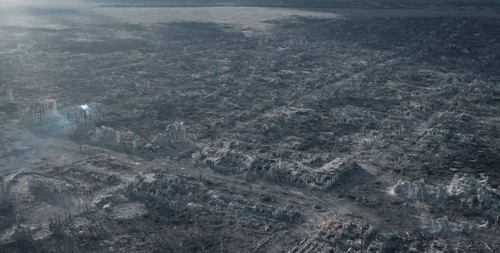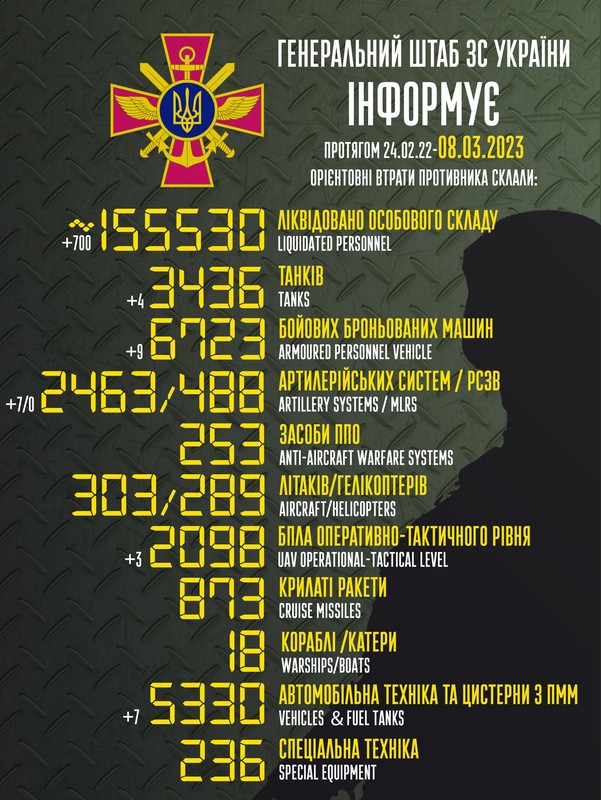Satellite images of intelligence in recent days have shown that the Russians are building defense lines in the Zaporizhzhia region of Ukraine they captured. It is quite logical, because it is the strike of the armed forces of Ukraine in the direction of Melitopol or Mariupol can cut the entire Russian group in half, as well as completely cut off the Russians from Crimea, through they conduct a significant part of their logistics.
The situation has really changed a lot, compared to the summer of 2022, when the Russians had their last success: they captured the cities of Severodonetsk and Lysychansk in the first half of summer. During the storming of Severodonetsk and Lysychansk (and later also Bakhmut), the Russians daily poured a barrage of 40,000-50,000 shells into the positions of the Ukrainian defenders. The fire did not subside for 16 hours a day. The intensity of fire significantly exceeded even the famous battle of Verdun in the First World War.
The photo below: almost a "lunar landscape"... The once Ukrainian city of Maryinka, where 10,000 residents lived before the war, was practically wiped off the face of the earth by the Russians. And there are already dozens of such destroyed cities in Ukraine.

At the same time, the Ukrainian army during the defense of Severodonetsk could only return fire with 5,000 thousand shells per day. And the diminutive word "only" does not sound 100% appropriate here, because even shooting 10 times less than the Russians, the Ukrainian army spent as many shells per month as all European NATO countries produce per year. But this was compensated by significantly greater accuracy than the Russians. Now NATO countries, including the USA, have greatly increased the production of new shells for Ukraine.
GIF: Scouts of the 93rd Brigade of the Armed Forces of Ukraine shared a short video of what Bakhmut looks like from the balcony of a house on March 7, 2023.
So, the Russians had their last operational (not even strategic) success, until they can fire 50,000 shells a day, literally razing locality to the ground. They always fought not with quality, but with quantity. Therefore, when their reserves of shells were exhausted, the Russians, not for the first month, switched to the tactic of "throwing Ukrainian positions with meat" (that is, to the attacks of numerous waves of infantry).
In recent weeks, it has been seen at the front that the Russians have replaced the losses of their equipment with armored vehicles that are approximately 70 years old. In particular, armored vehicles manufactured in 1954 have been noticed (that is, this military equipment is already 66 years old). Even the First Guards Army, which is considered the most important tank formation of the Russian Federation, has long been replenished with old T-62 tanks. It is clear that a tank is a tank, and it represents a significant threat (especially if it is simply dug in on the defense lines), and yet this removal from warehouses of storage of such scrap indicates a crisis in the supply of the Russian army. Let me remind you that at the beginning of the war, Russia attacked Ukraine with approximately 3,400 modern tanks and 7,000 armored vehicles, but almost all of this has already been destroyed.

Today, for the first time, Ukrainian forces used a high-precision American bomb JDAM-ER against the Russian invaders. These bombs are a modern game-changing superweapon, just as the Himars multiple-launch rocket systems once did. The JDAM-ER is an even more powerful weapon, having various types of heavier warheads (even 226 kg and 907 kg).
A bit of fun at the end. Someone filmed the Slovak self-propelled gun "Suzanne" at the front (in the Ukrainian Army), with identification marks of the "РСН ПЗД": these are only vowels in Cyrillic, an abbreviation for "Russians will be fucked" (roughly so, it is difficult to translate the meaning embedded in jargon).
The positive attitude of the army, people, and allies of Ukraine is increasingly felt.
Comments